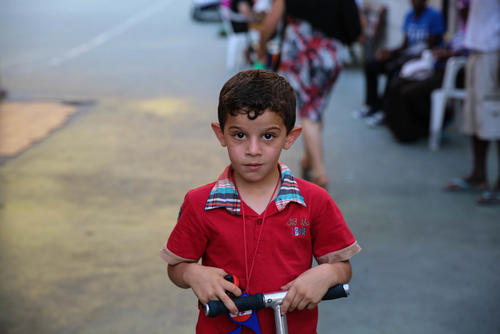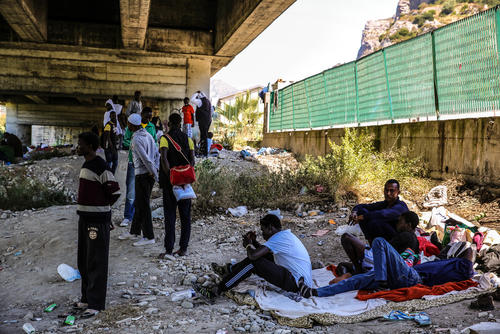Ventimiglia, Italy - As a consequence of the ever-stricter border policies in place in Europe since the sharp increase in migration in 2015, the Italian town of Ventimiglia, near the French border, has turned into the main transit point for migrants trying to reach other EU countries from Italy. Since the end of 2016, Médécins Sans Frontières (MSF) has started providing maternal care and mental health support to migrants in transit to France, who are stuck at the border with no access to basic health care. With the arrival of summer, more people have reached the border city, and have been unable to find shelter in the existing facilities.
As with other migration routes within the EU (for example the route through the Balkans), the border between Italy and France represents a further obstacle in the course through Europe, which for some is insurmountable. Migrants arrive in Ventimiglia to then reach France, but the only alternative they have is to cross the border illegally and via dangerous routes; among them there are many pregnant women, entire families, and unaccompanied minors.
The border closure, a lack of places providing adequate hospitality, and no access to basic facilities and healthcare are added layers to an exhausting situation migrants in transit have been experiencing for months, or even years. Their prolonged stay at the borders with no acceptable options in Italy deeply affects their physical and mental health. Many try to cross the border on foot – undertaking risky pathways in the mountains or along highway tunnels between France and Italy – only to be pushed back to Italy. Since September 2016, 10 migrants have died in the attempt to reach France.
This situation of permanent limbo often causes the repetition of mental health issues including depression, a sense of abandonment, post-traumatic symptoms, apathy, symptoms of adjustment anxiety and, in certain cases, psychosomatic problems. For many of them, the rough living conditions are compounded by re-experiencing traumatic events suffered during the trip, such as physical violence, humiliation, forced imprisonment, and the deprivation of basic needs.

“Dire living conditions make migrants all the more vulnerable. Many of them are fleeing from horrible situations in their countries of origin and have experienced deep trauma along the migration route,” explains Federico Saracini, project coordinator for MSF in Ventimiglia. “These are the direct effects of European deterrence policies; people are obliged to put their life at risk and to live in undignified conditions for months.”
Faced with a constant flow of new arrivals since 2014, Italy’s reception system still works in an emergency mode, and fails to meet the needs of the most vulnerable migrants. Lacking an institutional response, local civil society have set up a temporary shelter at the parish of Sant Antonio alle Gianchette since last summer, where families, women and children are hosted and provided meals. In June, a total of 444 people (198 women and 246 men), coming mainly from Sudan, Eritrea and other African countries such as Guinea Bissau, Ethiopia, Côte d'Ivoire and Chad were provided shelter at Le Gianchette. Among them are also very young children, like two-month old Raheek from Sudan, who crossed the Sahara and the Mediterranean Sea with her parents. They arrived at the parish after a long journey through Italy. They are fearful of the uncertain future ahead of them.
MSF is providing maternal health care services, mental health support and medical consultations, as well as providing food and non-food donations. MSF is also providing local volunteers doctors with cultural mediation. Since the beginning of 2017, 1,860 healthcare consultations have been provided. In August 2016, the prefecture opened a temporary camp just out of the city where only single men were allowed. Since last month, unaccompanied minors have been allowed in too. However, between 150 and 300 people continue to sleep along the river bank of the Roya, without access to basic services.




